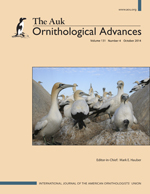One of the most commonly estimated parameters in studies of songbird ecology is reproductive success, as a measure of either individual fitness or population productivity. Traditionally, the “success” in reproductive success refers to whether, or how many, nestlings leave nests. Here, we advocate that “reproductive success” in songbirds be redefined as full-season productivity, or the number of young raised to independence from adult care in a breeding season. A growing body of evidence demonstrates interdependence between nest success and fledgling survival, and emphasizes that data from either life stage alone can produce misleading measures of individual fitness and population productivity. Nest success, therefore, is an insufficient measure of reproductive success, and songbird ecology needs to progress beyond this long-standing paradigm. Full-season productivity, an evolutionarily rational measure of reproductive success, provides the framework for appropriately addressing unresolved questions about the adaptive significance of many breeding behaviors and within which effective breeding-grounds conservation and management can be designed.
How to translate text using browser tools
17 September 2014
Redefining reproductive success in songbirds: Moving beyond the nest success paradigm
Henry M. Streby,
Jeanine M. Refsnider,
David E. Andersen

The Auk
Vol. 131 • No. 4
October 2014
Vol. 131 • No. 4
October 2014
avian ecology
breeding behavior
fitness
fledgling stage
full-season productivity
population ecology




